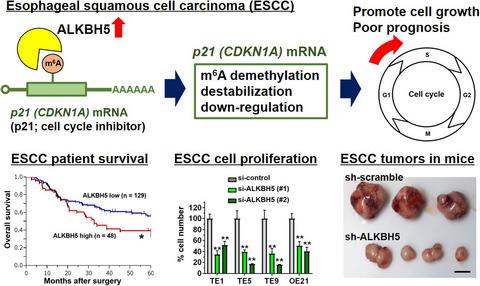当前位置:
X-MOL 学术
›
Genes Cells
›
论文详情
Our official English website, www.x-mol.net, welcomes your feedback! (Note: you will need to create a separate account there.)
m6 A demethylase ALKBH5 promotes proliferation of esophageal squamous cell carcinoma associated with poor prognosis.
Genes to Cells ( IF 2.1 ) Pub Date : 2020-05-25 , DOI: 10.1111/gtc.12792 Yushi Nagaki 1, 2 , Satoru Motoyama 2 , Tomokazu Yamaguchi 1 , Midori Hoshizaki 1, 3 , Yusuke Sato 2 , Teruki Sato 4 , Yukio Koizumi 1 , Akiyuki Wakita 2 , Yuta Kawakita 2 , Kazuhiro Imai 2 , Hiroshi Nanjo 5 , Hiroyuki Watanabe 4 , Yumiko Imai 3 , Yoshihiro Minamiya 2 , Keiji Kuba 1
Genes to Cells ( IF 2.1 ) Pub Date : 2020-05-25 , DOI: 10.1111/gtc.12792 Yushi Nagaki 1, 2 , Satoru Motoyama 2 , Tomokazu Yamaguchi 1 , Midori Hoshizaki 1, 3 , Yusuke Sato 2 , Teruki Sato 4 , Yukio Koizumi 1 , Akiyuki Wakita 2 , Yuta Kawakita 2 , Kazuhiro Imai 2 , Hiroshi Nanjo 5 , Hiroyuki Watanabe 4 , Yumiko Imai 3 , Yoshihiro Minamiya 2 , Keiji Kuba 1
Affiliation

|
Esophageal squamous cell carcinoma (ESCC) is one of the most fatal types of malignant tumors worldwide. Epitranscriptome, such as N6‐methyladenosine (m6A) of mRNA, is an abundant post‐transcriptional mRNA modification and has been recently implicated to play roles in several cancers, whereas the significance of m6A modifications is virtually unknown in ESCC. Analysis of tissue microarray of the tumors in 177 ESCC patients showed that higher expression of m6A demethylase ALKBH5 correlated with poor prognosis and that ALKBH5 was an independent prognostic factor of the survival of patients. There was no correlation between the other demethylase FTO and prognosis. siRNA knockdown of ALKBH5 but not FTO significantly suppressed proliferation and migration of human ESCC cells. ALKBH5 knockdown delayed progression of cell cycle and accumulated the cells to G0/G1 phase. Mechanistically, expression of CDKN1A (p21) was significantly up‐regulated in ALKBH5‐depleted cells, and m6A modification and stability of CDKN1A mRNA were increased by ALKBH5 knockdown. Furthermore, depletion of ALKBH5 substantially suppressed tumor growth of ESCC cells subcutaneously transplanted in BALB/c nude mice. Collectively, we identify ALKBH5 as the first m6A demethylase that accelerates cell cycle progression and promotes cell proliferation of ESCC cells, which is associated with poor prognosis of ESCC patients.
中文翻译:

m6 去甲基化酶 ALKBH5 促进与预后不良相关的食管鳞状细胞癌的增殖。
食管鳞状细胞癌(ESCC)是全球最致命的恶性肿瘤之一。表观转录组,例如mRNA 的N 6 -甲基腺苷(m 6 A),是一种丰富的转录后 mRNA 修饰,最近被认为在多种癌症中发挥作用,而 m 6 A 修饰的意义在 ESCC 中几乎未知。177例ESCC患者肿瘤组织微阵列分析显示m 6表达较高去甲基化酶 ALKBH5 与不良预后相关,并且 ALKBH5 是患者生存的独立预后因素。其他去甲基化酶 FTO 与预后之间没有相关性。ALKBH5而非FTO的siRNA敲低显着抑制人ESCC细胞的增殖和迁移。ALKBH5 敲低延迟了细胞周期的进程并将细胞积累到 G0/G1 期。从机制上讲,CDKN1A (p21) 的表达在 ALKBH5 耗尽的细胞中显着上调,并且CDKN1A mRNA 的m 6 A 修饰和稳定性因 ALKBH5 敲低而增加。此外,ALKBH5 的消耗显着抑制了皮下移植到 BALB/c 裸鼠中的 ESCC 细胞的肿瘤生长。总的来说,我们将 ALKBH5 确定为第一个 m6一种加速细胞周期进程并促进 ESCC 细胞增殖的去甲基化酶,这与 ESCC 患者的不良预后有关。
更新日期:2020-05-25
中文翻译:

m6 去甲基化酶 ALKBH5 促进与预后不良相关的食管鳞状细胞癌的增殖。
食管鳞状细胞癌(ESCC)是全球最致命的恶性肿瘤之一。表观转录组,例如mRNA 的N 6 -甲基腺苷(m 6 A),是一种丰富的转录后 mRNA 修饰,最近被认为在多种癌症中发挥作用,而 m 6 A 修饰的意义在 ESCC 中几乎未知。177例ESCC患者肿瘤组织微阵列分析显示m 6表达较高去甲基化酶 ALKBH5 与不良预后相关,并且 ALKBH5 是患者生存的独立预后因素。其他去甲基化酶 FTO 与预后之间没有相关性。ALKBH5而非FTO的siRNA敲低显着抑制人ESCC细胞的增殖和迁移。ALKBH5 敲低延迟了细胞周期的进程并将细胞积累到 G0/G1 期。从机制上讲,CDKN1A (p21) 的表达在 ALKBH5 耗尽的细胞中显着上调,并且CDKN1A mRNA 的m 6 A 修饰和稳定性因 ALKBH5 敲低而增加。此外,ALKBH5 的消耗显着抑制了皮下移植到 BALB/c 裸鼠中的 ESCC 细胞的肿瘤生长。总的来说,我们将 ALKBH5 确定为第一个 m6一种加速细胞周期进程并促进 ESCC 细胞增殖的去甲基化酶,这与 ESCC 患者的不良预后有关。


























 京公网安备 11010802027423号
京公网安备 11010802027423号